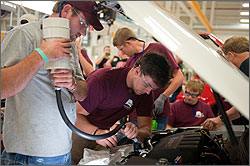Mississippi State University Achieves Year 2 of the EcoCAR Competition
|

 |
Category: EnergyType: News
Source: DOE (Weatherization)
Date: Wednesday, June 2nd, 2010

|

The Mississipi State University team works on its EcoCAR entry during the final days of the competition.
Credit: EcoCAR
|
After nearly 2 weeks of intense competition, Mississippi State University (MSU) claimed top recognizes on May 27 in the 2nd year of the EcoCAR competition, a three-year automotive engineering competition sponsored by D.O.E. and General Motors Corporation (GM). Officially dubbed "EcoCAR: The NeXt Challenge," the competition invited university engineering students from across North America to re-engineer a GM-donated sport utility vehicle to achieve improved fuel economy and reduced emissions. The 16 competing teams also strove to retain the vehicle's performance, safety, and consumer appeal. The MSU team met the challenge by building an extended-range electric vehicle (EREV), using a 21.3-kilowatt-hour battery pack from A123Systems that provided an electric range of 60 miles. That was backed up with a 1.3-liter, biodiesel-fueled, turbocharged diesel engine that powered a 75-kilowatt generator from UQM Technologies. The team kept the 2 systems separate, with the battery pack powering an 8-kilowatt motor on the rear transaxle, and the engine powering a 45-kilowatt motor on the front transaxle. During the competition, the vehicle achieved a fuel economy equivalent to 118 miles per gallon of gasoline. See a video of the car's design on YouTube.
The high fuel economy helped the MSU team garner 844 out of a possible 1,000 points, earning its first-place finish. Coming in 2nd place was the Virginia Tech University team, which built an EREV with a 40-mile electric range, also driven by a 21.3-kilowatt-hour battery pack, but with a 90-kilowatt motor. Their extended range was achieved with a flex-fueled, 2.4-liter, four-cylinder engine. Landing in 3rd place was Pennsylvania State University, again with an EREV, which used a 12.8-kilowatt-hour battery pack to power an 80-kilowatt motor. Like the MSU team, their backup power source was a 1.3-liter, biodiesel-fueled, turbocharged diesel engine, which powered a 75-kilowatt UQM generator.
The May competition included a series of safety and technical tests at GM's Desert Proving Grounds in Yuma, Arizona, marking the end of 2 years of hard work by the university teams. In the 1st year of the EcoCAR challenge, the teams determined the design for their vehicles, and in the 2nd year, they had to turn those designs into reality. For the next and final year, the teams will have to refine their vehicles to near-showroom quality. In the meantime, you can participate in a Web chat with the top 3 teams on Friday, June 4, at three p.m. EDT on the EcoCAR blog site, "Inside the Green Garage." See the press delivers from GM and MSU, as well as the EcoCAR Challenge Web location.
There are currently no comments for this story. Be the first to
add a comment!
Click here to add a comment about this story.

